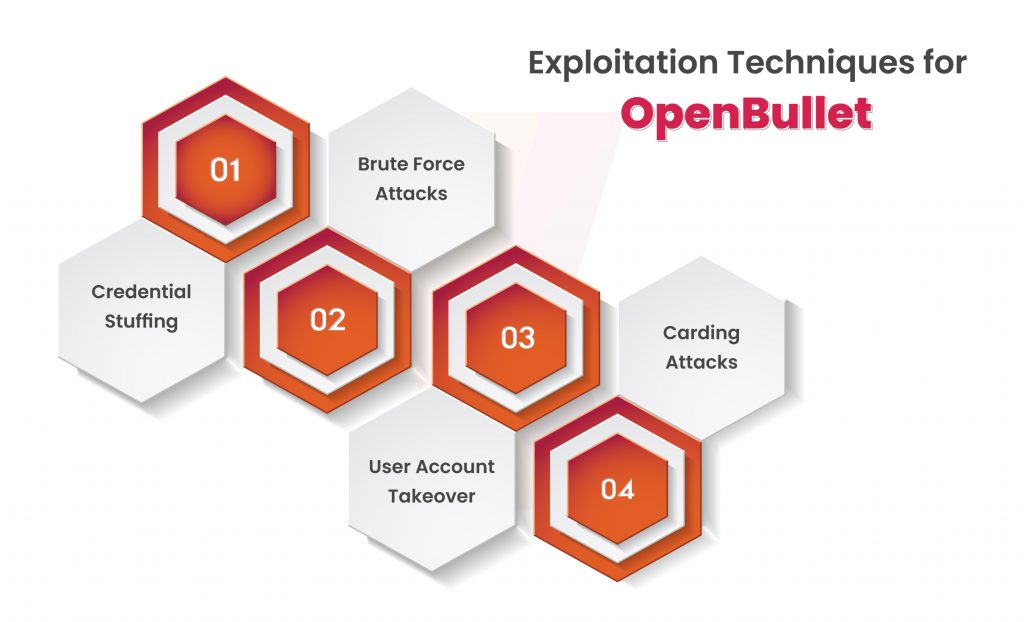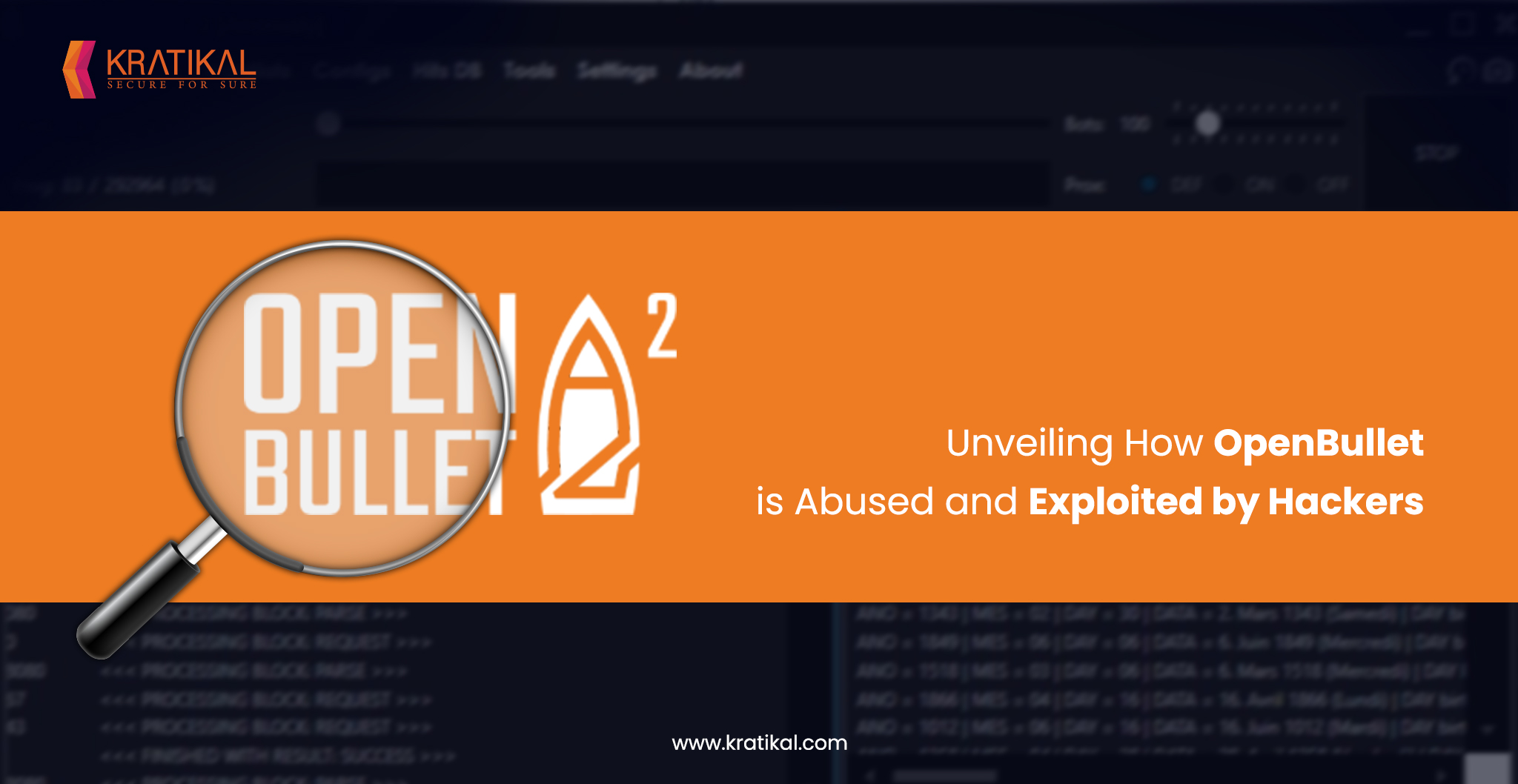The accessibility of data in modern times has made information security a top priority. In light of the rapid advancement of technology, hackers are always coming up with new strategies to use flaws and obtain unauthorized access to the systems. This is not just concerning for your business as a whole, but it may also have adverse impacts on how your organization is perceived. OpenBullet is one such tool that has attracted the interest of both cybersecurity experts and hackers.
This blog explores the OpenBullet tool and its exploitation. We will understand how hackers misuse and utilize the popularity of OpenBullet to compromise data safety. We’ll also discuss how vulnerability assessments, penetration testing, and cyber audits for the same can help to reduce cyber risks.
Table of Contents
What is OpenBullet?
At first glance, OpenBullet is a web scraping tool. Its easy-to-use interface and customization option make it a better option for script kiddies to run an attack on a target website.
However, OpenBullet has a dual nature. Nevertheless, like many other technologies do as well. It can be exploited maliciously in addition to being utilized for ethical hacking. Due to its web-based automation features, improper use of OpenBullet results in brute-forcing accounts for popular websites. Many websites such as Netflix, Amazon, etc. have been a target of this tool.
OpenBullet is seen as a platform for data exploitation by hackers and scammers due to its popularity and increased attention. They take advantage of its capacity to export configurations and share them easily, which encourages the growth of scams involving the sale of such compromised data.
Exploitation Techniques for OpenBullet
OpenBullet’s automated testing features have been misused by hackers in a variety of methods. This allows them to execute extensive cyber attacks. Prominent exploitation methods include:
Credential Stuffing
For Credential stuffing attacks, OpenBullet is one of the most often used tools. Hackers use OpenBullet to automate login attempts on numerous websites. This involves exploiting stolen username and password pairs from previous data breaches. Since people frequently use the same passwords across many sites, hackers can access numerous accounts.
Attackers can gain control of other users’ accounts by exploiting OpenBullet. They can take control of authentic user accounts and perform unauthorized access, data theft, and other malicious acts by taking advantage of flaws in authentication protocols.
Utilizing credential stuffing, OpenBullet can perform automated credential stuffing attacks, attempting a single password across multiple accounts.
One can find the usernames on various data breaches, leaks, or other hack forums.

From Sentry MBA to OpenBullet- Exploitative Realm
With the downfall of Sentry MBA and the subsequent emergence of OpenBullet, the world of credential-stuffing tools has undergone a shift. Unfortunately, hackers have started using these methods to access systems without authorization and commit cyber fraud online.
This demonstrates how important it is for businesses to strengthen their cybersecurity posture through Vulnerability Assessment and Penetration Testing (VAPT) services, safeguarding themselves against possible hackers.
Get in!
Join our weekly newsletter and stay updated
The Allure of OpenBullet for Hackers
Hackers are drawn to OpenBullet for several reasons, which is an intricate phenomenon. It is a top option for hackers looking to engage in illegal activities due to its features like
- Adaptability
- Open-source Nature
- Resource Efficiency
- User-friendly Interface
- Strong Community Support
Hackers prefer OpenBullet, which receives 35% more highlighting than its rivals. Due to its adaptability, open-source design, and effectiveness, as well as its cost-free access and hidden operations. OpenBullet remains an essential component in the changing cyber scenario, changing the nature of contemporary cybercrime.
Guarding Against OpenBullet’s Cyber Threats
Organizations must implement proactive cybersecurity measures to counter the potential threats posed by OpenBullet In this context, cyber audits, vulnerability assessments, and penetration testing are essential.
Proper Defense Mechanism Against Brute-Force Attacks
To defend against such an attack, website admins should set up proper defense mechanisms to implement password attempt limits. Websites are prepared against brute force attacks, where an attacker tries multiple passwords on a single user or username. However, what would happen if the attacker is trying multiple usernames with a single password? This is known as Password Spraying. Pentesters need to audit and prevent such password attack attempts.
( Unauthorised access to O365 users using Password Spraying )
Vulnerability Assessment and Penetration Testing
Regular Vulnerability Assessments play a key role in locating weak points in the security posture of the system. Organizations can patch vulnerabilities before they become exploited by hackers by vigilantly searching for them. Operating in this manner helps in minimizing potential cyber-attacks.
Beyond assessing vulnerabilities, penetration testing evaluates the system’s resilience by simulating actual attacks. Businesses can strengthen their security measures against cyber threats resulting from the unauthorized use of tools like OpenBullet with the help of this proactive strategy. Organizations can reduce the risk of attacks made possible by such exploitation by identifying and resolving vulnerabilities.
Book Your Free Cybersecurity Consultation Today!
Cyber Audits
Cyber audits comprise a thorough assessment of a company’s security measures. It follows safety protocols and creates norms as per the requirement of the organization. Businesses can monitor adherence to industry standards and identify potential improvement areas by performing routine audits. Businesses prioritize CERT-IN empanelled auditors’ cyber audits for greater security assurance.
By using cyber audits, organizations can find if any data leak or password breach has ever happened in their organization so that they can take appropriate action to prevent any further hacks.
Conclusion
OpenBullet serves as an alarming indicator of technology’s dual nature. It offers practical solutions to improve cybersecurity, but hackers may also misuse it to attack systems and data. To stay ahead of possible attacks, organizations must exercise vigilance. Businesses must use tools like vulnerability assessment, and penetration testing, and get regular cyber audits.
This approach, exemplified by Kratikal’s experience as a CERT-IN empanelled auditor, gives companies the ability to combat possible cyber threats. The secret of navigating this constantly changing environment is to remain knowledgeable, proactive, and risk-aware. We can all work together to make the internet a safer place by being aware of the technologies that hackers abuse and practicing ethical hacking.









Leave a comment
Your email address will not be published. Required fields are marked *